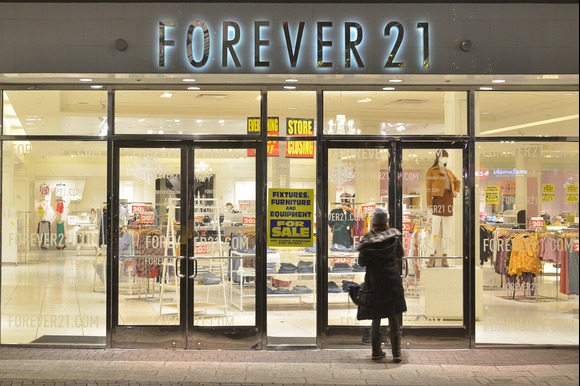Fast-fashion retailer Forever 21’s U.S. operating entity filed for Chapter 11 bankruptcy on Sunday, marking its second filing in six years. The company has struggled due to declining foot traffic in malls and increasing competition from online retailers.
This filing likely signals the company’s impending liquidation, as it has been unable to secure a buyer for its approximately 350 U.S. locations. However, its trademark and intellectual property, currently owned by Authentic Brands Group, may continue to exist in a different capacity.
The growth of e-commerce, coupled with the gradual decline of large American malls, has posed significant challenges for Forever 21. The company previously entered Chapter 11 in 2019 and was subsequently acquired by Sparc, a partnership between Authentic Brands Group and mall operators Simon Property and Brookfield Asset Management Inc.
Forever 21 announced that it will initiate liquidation sales at its stores while also engaging in a court-supervised process to sell and market some or all of its assets.
According to a filing with the bankruptcy court in the District of Delaware, the company estimates its assets to be between $100 million and $500 million, while its liabilities range from $1 billion to $10 billion. The filing also indicates that the number of creditors falls between 10,001 and 25,000.
In the case of a successful sale, Forever 21 indicated that it might shift from a complete cessation of operations to enable a going-concern transaction. The company confirmed that its stores and website in the United States will remain operational and continue to serve customers, while its international locations will remain unaffected.
Forever 21 is currently owned by Catalyst Brands, which was established on January 8 through the merger of the brand’s former owner, Sparc Group, and JC Penney, a department store chain that has been under the ownership of mall operators and Simon Property Group since 2020.
Upon its formation, Catalyst Brands announced that it was “exploring strategic options” for Forever 21.
Authentic Brands will retain ownership of Forever 21’s trademark and intellectual property, which may persist in some capacity.
Jamie Salter, CEO of Authentic Brands, referred to the acquisition of Forever 21 as “the biggest mistake I made” last year. Founded in Los Angeles in 1984 by South Korean immigrants, Forever 21 once enjoyed immense popularity among young consumers seeking stylish yet affordable clothing. At its peak in 2016, the company operated approximately 800 stores worldwide, with 500 located in the United States.






